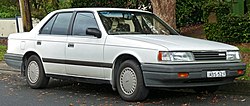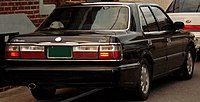Mazda 929
| Mazda 929 | |
|---|---|
| Production period: | 1973-1995 |
| Class : | upper middle class |
| Body versions : | Sedan , station wagon , coupé |
| Previous model: | Mazda 1800 |
| Successor: | Mazda Xedos 9 / Millenia |
The Mazda 929 was an upper middle class vehicle offered by the Japanese car manufacturer Mazda from autumn 1973 to the end of 1995 and was at times the brand's flagship. In Japan, the models were sold under the names Mazda Luce , Mazda Cosmo , Mazda Sentia and Ẽfini MS-9 . All generations have rear-wheel drive .
Model history
929 (LA2, 1973-1978)
| 1st generation | |
|---|---|
|
Mazda 929 (1973-1976) |
|
| Production period: | 1973-1978 |
| Body versions : | Sedan , station wagon , coupé |
| Engines: |
Gasoline engine : 1.8 liters (61 kW) |
| Length: | 4404 mm |
| Width: | 1666 mm |
| Height: | |
| Wheelbase : | 2510 mm |
| Empty weight : | 1095 kg |
In November 1973, production of the 929 of the LA2 series began as a sedan, station wagon and coupé. The only engine was a 1.8 l petrol engine with an output of 61 kW (83 hp).
In October 1976 the 929 received a facelift. It included rubber inserts around the bumpers as well as a larger grille.
In the spring of 1977 the 929 also came to Germany, but not in the station wagon version.
Technical specifications
| model | 1.8 |
|---|---|
| Number of cylinders | R4 |
| Displacement (cm³) | 1769 |
| Max. Power (kW / PS) | 61/83 at 5000 |
| Max. Torque (Nm) | 134 at 2500 (AT = 134 at 3000) |
| Top speed (km / h) | 160 |
| Transmission (standard) | 4-speed manual transmission or 3-speed automatic |
| Acceleration (0-100 km / h) | 15.4 s (AT = 15.8 s) |
| Combined consumption (l / 100 km) | 9.4 l (AT = 10.5 l) |
| Tank capacity | 65 l |
929 (LA4, 1978-1982)
| 2nd generation | |
|---|---|
|
Mazda 929L (1978-1980) |
|
| Production period: | 1978-1982 |
| Body versions : | Limousine , station wagon |
| Engines: |
Otto engine : 2.0 liters (66 kW) |
| Length: | 4650 (sedan), 4670 (station wagon) mm |
| Width: | 1690 mm |
| Height: | 1415 (sedan), 1445 (station wagon) mm |
| Wheelbase : | 2610 mm |
| Empty weight : | 1120 kg |
In September 1978 the second generation (LA4) was introduced, which was initially available as a sedan and from April 1979 also as a station wagon V (V for variable). The coupe was initially not replaced.
In April 1980 the 929 received a facelift. The two front headlights previously arranged vertically one above the other were replaced by larger horizontal front headlights and wide rear lights were introduced.
In Germany, the sedan was sold under the designation "929L" and the station wagon as the "929L HV" with a carburettor engine that produced 66 kW (90 hp) from a 2.0 liter displacement.
929 (HB, 1982-1987)
| 3rd generation | |
|---|---|
|
Mazda 929 sedan (1982–1984) |
|
| Production period: | 1982-1987 |
| Body versions : | Limousine , coupe |
| Engines: |
Petrol engines : 2.0 liters (66-88 kW) |
| Length: | 4640 mm |
| Width: | 1690 mm |
| Height: | 1340 mm |
| Wheelbase : | 2615 mm |
| Empty weight : | 1135 kg |
In April 1982 the newly designed Mazda 929 of the HB series came on the market with a more modern, less baroque body shape. This model was also powered by the 2.0-liter carburettor engine with 66 kW.
In addition to the sedan, a 929 coupe was available in Germany. In contrast to the sedan, it had retractable double headlights and an analogue instrument display in digital optics. The rotary engine of the RX-7 (the coupé was called Cosmo ) was reserved for foreign models.
The combination model was visually slightly adapted to the new generation and built until the beginning of 1986.
Facelift
In March 1984, the 929 series received a facelift with slight changes to the body and two new engine variants: on the one hand the 2.0-liter carburettor engine with now 74 kW (101 hp) and improved smoothness, and a 2.0i injection engine with 88 kW (120 PS).
The coupé also underwent minor body touch-ups, which were mainly characterized by the omission of the third side window and new trim strips. There was also a larger range of exterior colors and upholstery, whereas previously there were only three paint finishes (cherry red, chateaux silver metallic and blue metallic) and the only interior color was brown.
The list of surcharges only included the selection of metallic paintwork. Other equipment details such as electric windows, electrically adjustable exterior mirrors, rear window wipers were standard on the GLX models (also on the Coupé).
929 (HC, 1987-1991)
| 4th generation | |
|---|---|
| Production period: | 1987-1991 |
| Body versions : | limousine |
| Engines: |
Petrol engines : 2.0-3.0 liters (66-140 kW) |
| Length: | 4690-4930 mm |
| Width: | 1695-1725 mm |
| Height: | 1440-1450 mm |
| Wheelbase : | 2710 mm |
| Empty weight : | 1380 kg |
In April 1987 a completely redesigned sedan with a length of 4.88 m and a width of 1.75 m, the 929 HC, was presented. A station wagon and a coupé were no longer offered. Three new engine variants were used as the engine, including a 2.2i with 12V multi-valve technology (two inlet and one outlet valve per cylinder):
- 2.0i: injection engine with 66 kW (LX)
- 2.2i 12V: injection with 100 kW and 85 kW G-Kat (GLX)
- 3.0i V6: injection engine with 140 kW (GLX)
From February 1988, the 2.2i and 3.0i were fitted with a catalytic converter , which reduced the engine output of the 2.2i to 86 kW and of the 3.0i to 125 kW. The LX was withdrawn from the program because it had not achieved the desired sales figures. In October 1989 the engines were revised again; the 2.2i now had 94 kW, the 3.0i V6 123 kW.
At the end of 1991 the production of the fourth 929 and with it the Luce was stopped. The successor was the Mazda Sentia , which was still offered as Mazda 929 on some markets. In Europe, the 929 was replaced by the Mazda Xedos 9 from autumn 1993 .
Kia Potentia
As the successor to the Peugeot 604 built under license , Kia Motors produced the 929 HC from 1992 to 2001 in the last version as the Kia Potentia with the 2.2-liter or 3.0-liter V6 petrol engine. The successor to the Kia Enterprise was introduced in 1997 , while the Potentia received another facelift.
929 (HD, 1991-1995)
| 5th generation | |
|---|---|
|
Mazda 929 Serenia (1992) |
|
| Production period: | 1991-1995 |
| Body versions : | limousine |
| Engines: |
Petrol engines : 2.5-3.0 liters (118-151 kW) |
| Length: | 4925 mm |
| Width: | 1795 mm |
| Height: | 1380 mm |
| Wheelbase : | 2850 mm |
| Empty weight : | 1590-1640 kg |
The fifth generation, which was introduced at the end of 1991, was only offered in a few markets (e.g. Canada and Australia), while the new front-wheel drive model Xedos 9 (also Millenia) replaced the 929 in most export markets .
At the end of 1995 sales of the 929 were finally discontinued, while the sister model Sentia was still offered on the Japanese market.






















